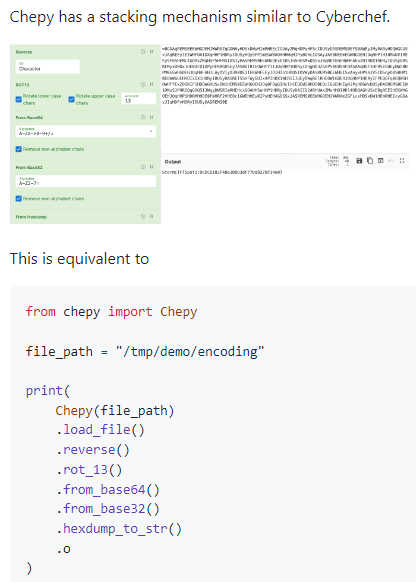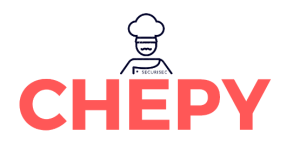| Chepy - The Hacker's Toolbox |
| Written by Nikos Vaggalis | |||
| Thursday, 19 October 2023 | |||
|
Chepy is a Python library and is the CLI equivalent of GCHQ's CyberChef multi-hacker-tool. To give some context, CyberChef is an open source tool that runs in browser released by GCHQ - yes, the British government intelligence agency. With CyberChef you can do encoding, encrypting and converting data formats as examined in detail in "CyberChef - The Developer's Ultimate Toolbox": CyberChef is a general purpose tool, therefore more useful than the specialized and niche Ghidra. It's a tool that provides functionality that every developer needs for their day-to-day workload. That range of functionality is staggeringly large, ranging from the popular toBase64/fromBase64 and URL encode/decode, to encryption with AES/DES/Blowfish and JWT, to Arithmetic and Logic with calc and bitwise operations, up to Language and Charset conversions. CyberChef, and its Chepy implementation, can be used in popular scenarios like:
Such a tool would be particularly handy when taking part in Hacking CTF competitions. Chepy is CyberChef but being offered as a Python library and a handy cli, trying to mirror some of the capabilities of CyberChef. That means that it (still) doesn't support the full spectrum of CyberChef's capabilities, but it is slowly getting there. As a library it meansn that whereas you did your crypto operations through the browser, now you do them through code. This example will illustrate the point:
The advantage is that you can write scripts that automate or chain operations, something very useful when tackling CTFs as we examined in "Play & Learn With CryptoHack"; a fun way to learn cryptography and also acquire valuable CTF skills, through a series of puzzles which challenges you to break bad implementations of "modern" crypto, such as AES, RSA, and Elliptic-curves. CryptoHack suggests that While you can use converters found online for your encoding/decoding needs, like CyberChef, it is suggested you use a programming language in coding your solution. The platform prefers Python 3 and provides snippets of Python source code which you can adapt to your own purposes. As such Chepy is spot on on the requirements of CryptoHack. All in all, Chepy compared to CyberChef has distinct advantages as well as disadvantages: Advantages
Disadvantages
Chepy can be installed with pip, git and Docker. Full instructions on the project's Github repo. More InformationRelated ArticlesCyberChef - The Developer's Ultimate Toolbox NSA's Cybersecurity Curriculum
To be informed about new articles on I Programmer, sign up for our weekly newsletter, subscribe to the RSS feed and follow us on Facebook or Linkedin.
Comments
or email your comment to: comments@i-programmer.info |



